Select Language

By Daniel Leussink and Tom Bateman
TOKYO (Reuters) - In the coming years, Satoaki Kanoh needs to replace almost a dozen ageing machines at his Tokyo-based maker of acrylic panels, a major undertaking that he worries will become even more expensive.
"Ideally, I'd like to do one a year. But I don't have that much money," Kanoh said of the customised pieces of machinery that cost around 50 million yen ($330,000) apiece.
"If we have to pay a lot to borrow, we could end up in a really tough spot."
Japan's central bank this week raised interest rates for the first time in 17 years and scrapped its negative rates policy. While the move is more symbolic than anything else - rates remain pinned near zero - it has nonetheless opened the door to something Japan hasn't seen in decades: a world where it will cost more to borrow money.
Now, millions of Japanese, from small business owners like Kanoh to first-time homebuyers, are sizing up how to adapt to higher borrowing costs after the long, lean years of deflation, when prices, wages and the cost of money changed little.
How they cope will have vast implications in an economy where small and medium-sized companies employ some 70% of the workforce and private consumption accounts for more than half of the gross domestic product.
Kanoh worries about the potential pace of rate increases. Too much too quickly and Japan won't be able to adapt, he said.
His company, Shinshi Co., has about 100 million yen in loans now, but that's at a fixed rate.
Even on a smaller loan of about 10 million yen, the difference between 3% and 1% would be considerable, with the annual interest payment on 3% equivalent to an one employee's monthly salary, he said.
DEFLATION PLAYBOOK
Japanese companies and households have long stuck to a deflation playbook: hoard cash and cut costs. That left the economy in a vicious cycle of stop-start growth and flat-lining wages.
Shaking off that deflationary mindset, may prove difficult, even as prices, and some wages, go up.
While big companies are now giving some of the largest pay increases in decades, it's less clear how much will trickle down to smaller firms.
Around 60% of Japanese firms expect rates to rise to 0.25% by the end of the year, a Reuters survey showed on Thursday. Many said they are looking to front-load spending before borrowing costs rise.Eiichi Hagiwara, who owns a Tokyo-based designer of water treatment equipment, says higher borrowing costs could eat into the already razor-thin margins at small companies.
For him, that could take bigger projects off the table, as those require loans to cover materials and other costs up front, he said. Having to pay interest ultimately means lower profit margins.
"There's no work with big margins now," Hagiwara said. "If I don't lower prices I can't get the work."
Generally he eschews lending, preferring to keep cash reserves for operational costs. He also relies on soft skills, such as taking customers out to cement relationships.
The 76-year-old set up his company, EN-TEC, two decades ago and employs around 20 people. One key to success is being prudent, and ensuring prices are kept low to preserve business ties.
"You have to make sure to take the minimum profit you can," he said. "If you borrow money and interest rates go up, you'll be in trouble."
Hagiwara has only taken out a big loan once, about a decade ago, for around 100 million yen to buy the building for the company headquarters.
But word of the loan soon got out and associates and competitors assumed the company was in trouble. Hagiwara then decided to pay it back in full, which he did within half a year of borrowing the money.
SILVER LINING
Some business owners, especially those reliant on imports, hope interest rates could finally put a floor under the weak yen. The currency's chronic sell-off has driven up the cost of food and fuel.
For Yasunobu Tashiro, who runs a restaurant and a shop selling handbags and other imported goods in the hot spring town of Kinugawa Onsen, the yen has been a massive headache.
"We're in the import business so the weak yen has been causing us a lot of trouble when we go overseas," he said. Purchases that used to cost the equivalent of $6,700 now cost $10,000 he said.
However, Haruka Yoda, a 29-year-old IT engineer, is more upbeat.
He's borrowed money to buy a home with his wife and one-month-old baby.
"I feel hopeful that they won't move too much," he said."Even if interest rates rise significantly our salaries might also go up," he said.
($1 = 151.0600 yen)
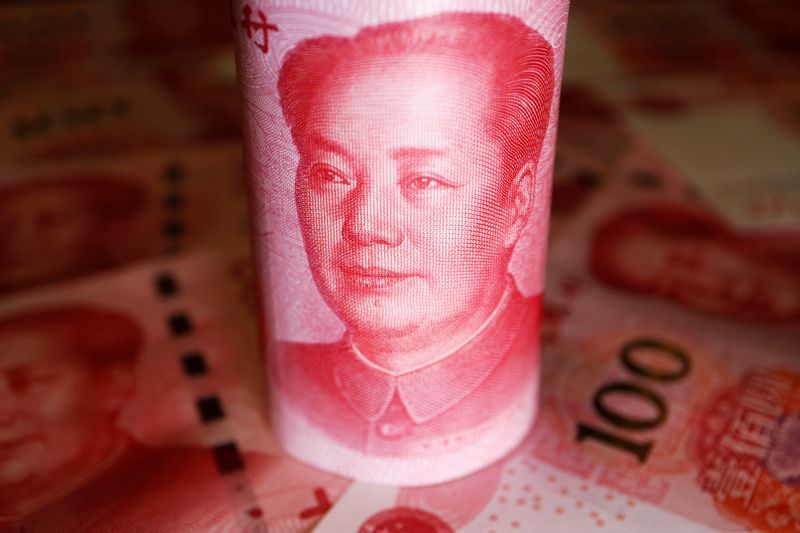
SHANGHAI (Reuters) - China's yuan weakened to a four-month low against the dollar on Friday, breaching a key threshold and prompting state-owned banks to step in to defend the currency.
In the spot market, the onshore yuan fell to the weak side of the psychologically important 7.2 per dollar level to hit a low of 7.24, its softest since Nov. 17, 2023.
Market sources told Reuters that state banks stepped in subsequently to buy the yuan for dollars. By 0240 GMT, the yuan was at 7.224, closer to where it opened.
The sources declined to be identified because they are not authorised to speak publicly about market trades.
The yuan has fallen more than 2% in three months, and has been pressured by growing market expectations of further monetary easing to prop up the world's second-largest economy.
Prior to the market opening, the People's Bank of China (PBOC) set the midpoint rate, around which the yuan is allowed to trade in a 2% band, at 7.1004 per dollar, 62 pips weaker than the previous fix of 7.0942.
The Chinese central bank has for months been setting the rate at levels firmer than market projections, traders said.
Friday's midpoint was 1,143 pips firmer than a Reuters estimate of 7.2147, the biggest discrepancy since November.
The offshore yuan meanwhile continued to weaken to hit a more than four-month low of 7.2525.
The sudden burst of weakness in the yuan weighed on stock markets too, with the benchmark Shanghai stock index down 1.4%.
Traders attributed sudden weakness in the yuan to rising monetary easing expectations after senior PBOC officials hinted at there being further room to reduce bank reserve requirements.
China has room to further cut banks' reserve requirement ratio (RRR), among other policy tools at its disposal, a deputy central bank head said on Thursday, underlining market expectations for more easing measures to bolster the economy.
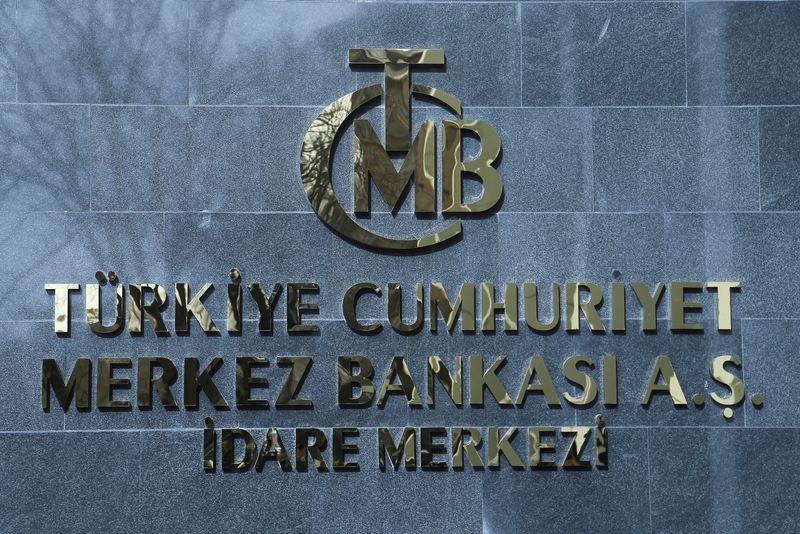
By Ezgi Erkoyun and Daren Butler
ISTANBUL (Reuters) - Turkey's central bank unexpectedly hiked interest rates by 500 basis points to 50% on Thursday, citing a deteriorating inflation outlook and pledging to tighten even further if it expects the price situation to worsen significantly.
The hawkish surprise came 10 days before nationwide local elections and was seen by analysts as a signal that the central bank was independent from any political constraints, and determined to tackle inflation that is soaring toward 70%.
In response the lira currency rallied as much as 2% and settled around 31.9 against the dollar, reversing weeks of steady declines, and Turkey's dollar bonds extended a rally.
The rate hike - which outstripped virtually all forecasts - "stunned the market," said Piotr Matys, senior FX analyst at In Touch Capital Markets in London.
"Today's decision is a very strong signal that Governor (Fatih) Karahan, who took over from (Hafize Gaye) Erkan when she unexpectedly resigned, is determined to bring staggeringly high inflation under control," he said.
The bank has now raised its key one-week repo rate by 4,150 basis points from 8.5% since last June, following President Tayyip Erdogan's victory in May elections and U-turn towards greater orthodoxy in economic policy.
The "tight monetary stance will be maintained until a significant and sustained decline in the underlying trend of monthly inflation is observed, and inflation expectations converge to the projected forecast range," it said.
Policy "will be tightened in case a significant and persistent deterioration in inflation is foreseen," it added after the monthly meeting of its monetary policy committee.
Goldman Sachs said central bank's move represents a one-off adjustment to saddle inflation expectations rather than the beginning of another tightening cycle.
To reinforce the tightening move, the central bank also adjusted its policy operational framework, setting the overnight borrowing and lending rates 300 basis points below and above the repo rate.
PRE-ELECTION RATE HIKE
Inflation rose to a higher than expected 67% last month, when the central bank had held rates steady after a sustained string of hikes since June.
While inflation is expected to dip around mid-year, expectations remain stubbornly high. The recent lira slide coupled with declining foreign reserves had raised some expectations of more rate hikes ahead - though not until after the March 31 municipal vote for which Erdogan's AK Party is trying to win back key cities like Istanbul.
In a Reuters poll, 20 of 22 respondents expected the bank to keep the rate steady in March, while the other two forecasted a hike of only 250 basis points. The poll showed however that a strong majority expected it to hike again later this year.
The central bank in recent weeks took other steps to tighten credit including action on reserve requirements, prompting some banks to either reduce loan limits or even stop offering loans. It also raised the maximum rate on credit card cash withdrawals.
Tighter fiscal policy is expected after the coming elections, adding to the rising credit costs and compounding economic pain for Turks after a years-long cost-of-living crisis.
Earlier this month, Finance Minister Mehmet Simsek promised steps to help the central bank reduce inflation. Fiscal stimulus cooled significantly after last year's May general elections but picked up a bit in recent months ahead of this month's vote.
"You can read into this (rate hike) that Simsek and the central bank have the capacity to be more aggressive, upcoming election or not," said Peter Kisler, EM portfolio manager at Trium Capital in London.
Last Friday, the central bank's monthly survey of market participants' expectations showed that Turkey's year-end annual inflation was seen at 44.19%, higher than the bank's own forecast of 36%.
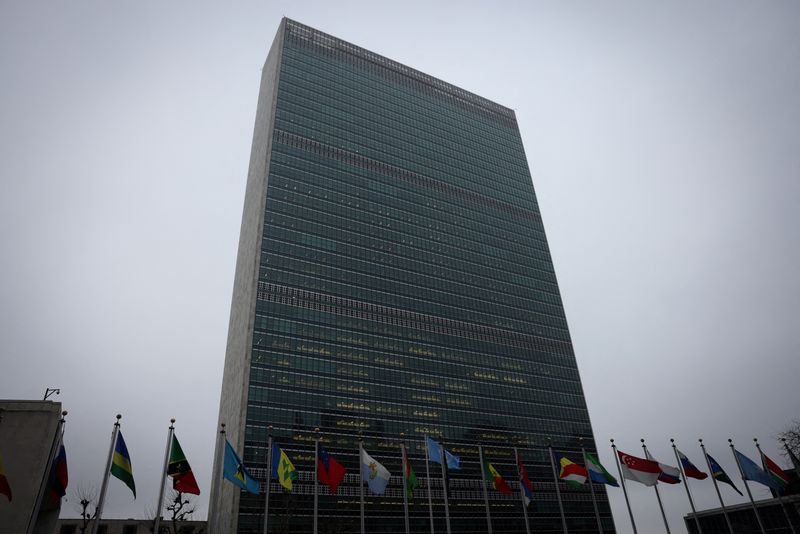
By Alexandra Alper
(Reuters) - The United Nations General Assembly on Thursday unanimously adopted the first global resolution on artificial intelligence to encourage countries to safeguard human rights, protect personal data, and monitor AI for risks.
The nonbinding resolution, proposed by the United States and co-sponsored by China and 122 other nations, took three months to negotiate and also advocates for strengthening privacy policies, senior U.S. administration officials said, briefing reporters before the resolution's approval.
"Today, all 193 members of the United Nations General Assembly have spoken in one voice, and together, chosen to govern artificial intelligence rather than let it govern us," U.S. Ambassador to the United Nations Linda Thomas-Greenfield said.
The resolution is the latest in a series of initiatives - few of which carry teeth - by governments around the world to shape AI's development, amid fears it could be used to disrupt democratic processes, turbocharge fraud or lead to dramatic job losses, among other harms.
"The improper or malicious design, development, deployment and use of artificial intelligence systems ... pose risks that could ... undercut the protection, promotion and enjoyment of human rights and fundamental freedoms," the measure says. In November, the U.S., Britain and more than a dozen other countries unveiled the first detailed international agreement on how to keep artificial intelligence safe from rogue actors, pushing for companies to create AI systems that are "secure by design."
Europe is ahead of the United States, with EU lawmakers adopting a provisional agreement this month to oversee the technology. The Biden administration has been pressing lawmakers for AI regulation, but a polarized U.S. Congress has made little headway.
In the meantime, the White House sought to reduce AI risks to consumers, workers, and minority groups while bolstering national security with a new executive order in October.
Asked whether negotiators faced resistance from Russia or China, the officials conceded there were "lots of heated conversations. ... But we actively engaged with China, Russia, Cuba, other countries that often don’t see eye to eye with us on issues."
"We believe the resolution strikes the appropriate balance between furthering development, while continuing to protect human rights," said one of the officials, who spoke on condition of anonymity.
Like governments around the world, Chinese and Russian officials are eagerly exploring the use of AI tools for a variety of purposes. Last month, Microsoft (NASDAQ:MSFT) said it had caught hackers from both countries using Microsoft-backed OpenAI software to hone their espionage skills.
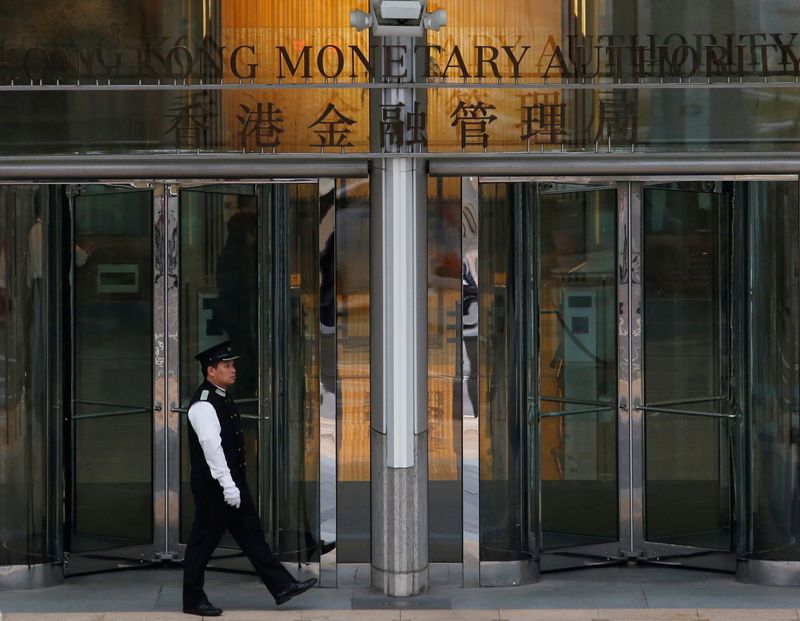
HONG KONG (Reuters) - The Hong Kong Monetary Authority (HKMA) left its base rate charged through the overnight discount window unchanged at 5.75% on Thursday, tracking a move by the U.S. Federal Reserve to keep rates steady.
Fed Chair Jerome Powell said on Wednesday recent high inflation readings had not changed the underlying "story" of slowly easing price pressures in the U.S. as the central bank stayed on track for three interest rate cuts this year and affirmed that solid economic growth will continue.
HKMA said the Fed might cut rates three times for a total of 75 basis points this year, but the actual timing and the interest rate path thereafter remain uncertain and the high interest rate environment may last for some time.
"The financial and monetary markets of Hong Kong continue to operate in a smooth and orderly manner," HKMA said in a statement.
"The Hong Kong dollar exchange rate remains stable, and the Hong Kong dollar interbank rates might remain high for some time," HKMA said, adding the public should manage the relevant risks when making property purchase, mortgage or other borrowing decisions.
HSBC Holdings (NYSE:HSBC) said its best lending rate in Hong Kong remains unchanged at 5.875%.
Hong Kong's monetary policy moves in lock-step with the United States as the city's currency is pegged to the greenback in a tight range of 7.75-7.85 per dollar.

By Rae Wee
SINGAPORE (Reuters) -The yen rose sharply on Thursday in part due to a broadly weaker dollar, but also drew support from expectations of further rate hikes from the Bank of Japan later this year and some jawboning efforts from Japanese government officials.
Down Under, the Australian dollar jumped after data on Thursday showed employment rebounded sharply in February and the jobless rate dived far below forecasts, pointing to a still-tight labour market.
The yen gained more than 0.5% to 150.46 per dollar, reversing some of its heavy losses in the wake of the BOJ's policy pivot.
Analysts said factors supporting the yen's rise included growing bets of another BOJ rate hike in July or October, as well as a rebound in business confidence in the Japanese economy.
Earlier on Thursday, the country's finance minister Shunichi Suzuki also said the government was watching currency market moves with "a high sense of urgency", following the yen's decline to a four-month trough of 151.82 in the previous session and toward a multi-decade low.
"I think there's a bit of jawboning going on... given that the speed of the yen move has probably been a bit too rapid for what the Ministry of Finance officials would like to see," said Moh Siong Sim, a currency strategist at Bank of Singapore.
"That may have explained why dollar/yen has come off as well."
Still, the main driver remained a sliding U.S. dollar, after the Federal Reserve maintained its interest rate cut projections for the year in the face of upside surprises on inflation, and did not strike a more hawkish tone as some investors had feared.
At the conclusion of the Fed's policy meeting on Wednesday, Chair Jerome Powell said recent high inflation rate readings had not changed the underlying trend of slowly easing price pressures in the United States. The central bank stayed on track for three rate cuts this year, even though it projected slightly slower progress on inflation.
That sent the greenback tumbling as traders were quick to rebuild bets of a Fed easing cycle beginning in June, with markets now pricing in a 75% chance of a rate cut that month, as compared to 59% chance a day earlier, according to the CME FedWatch tool.
The euro and sterling notched one-week highs against the dollar on Thursday, rising to $1.0939 and $1.2803, respectively.
"The Fed really, really wants its soft-landing ending. Stronger growth, lower unemployment, higher inflation - and yet still no change to the median dot," said Seema Shah, chief global strategist at Principal Asset Management.
"Powell has perhaps shown his cards: he needs a good reason not to cut rates, rather than a reason to cut rates."
The dollar index was little changed at 103.22, after having slid more than 0.5% in the previous trading session.
With the Fed meeting out of the way, focus now turns to a rate decision from the Bank of England (BoE) later on Thursday, where expectations are for the central bank to keep rates on hold.
British inflation slowed in February, official data on Wednesday showed, keeping the BoE on track to start cutting borrowing costs later this year.
JOBS SURPRISE
A resurgence in Australia's February employment figures and a downtick in its jobless rate gave the Aussie a boost on Thursday.
Figures from the Australian Bureau of Statistics on Thursday showed net employment jumped 116,500 in February from January, surging past market expectations for a 40,000 increase, while the jobless rate dropped to 3.7%.
The Australian dollar jumped 0.6% to a one-week high of $0.6626.
"Employment data is always very volatile, and no single month of data should be read in isolation. However, today's figures are too strong to ignore," said Rob Carnell, ING's regional head of research for Asia-Pacific.
"In light of this data, (the Reserve Bank of Australia) are probably quietly relieved that they did not go further and adopt an outright easing bias this week."
The RBA had, at its policy meeting earlier this week, held interest rates steady and watered down its tightening bias.
Elsewhere, the New Zealand dollar was last 0.24% higher at $0.60965, though its gains were capped by domestic data showing New Zealand's economy shrank slightly in the fourth quarter, putting the country into a technical recession.
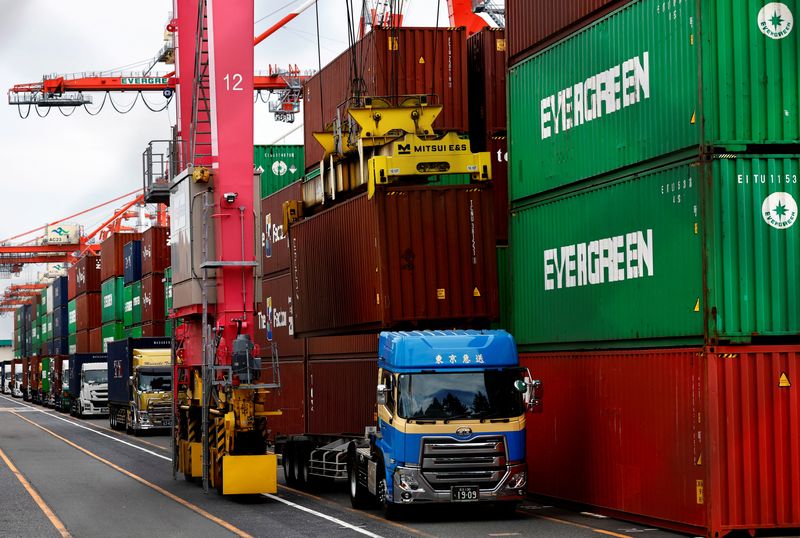
By Tetsushi Kajimoto
TOKYO (Reuters) - Japan's exports grew for a third straight month in February demand improved in the U.S., China and the European Union, offering some hope for policymakers seeking to revive growth after weak performance last year.
Exports rose 7.8% in February from the same month a year ago, Ministry of Finance data showed on Thursday, faster than the 5.3% gain expected by economists in a Reuters poll.
The trade data comes days after the central bank ditched years of unconventional easing in a shift towards normalising policy.
The Bank of Japan ended eight years of negative interest rates and other remnants of its unorthodox policy on Tuesday, making a historic shift away from decades of massive monetary stimulus. But it is expected to keep rates around zero for some time to support fragile growth.
Exports have been a source of concern for policymakers who worry about the fragile recovery in the world's fourth-largest economy, which narrowly dodged recession late last year.
Imports rose 0.5% year-on-year in February versus the median estimate for a 2.2% increase.
The trade balance came to a deficit of 379.4 billion yen ($2.52 billion), versus a median estimate for a deficit of 810.2 billion yen.
A Reuters monthly poll showed earlier on Thursday that big Japanese firms' confidence rebounded to a three-month high in March while the service-sector mood hit a seven-month high.
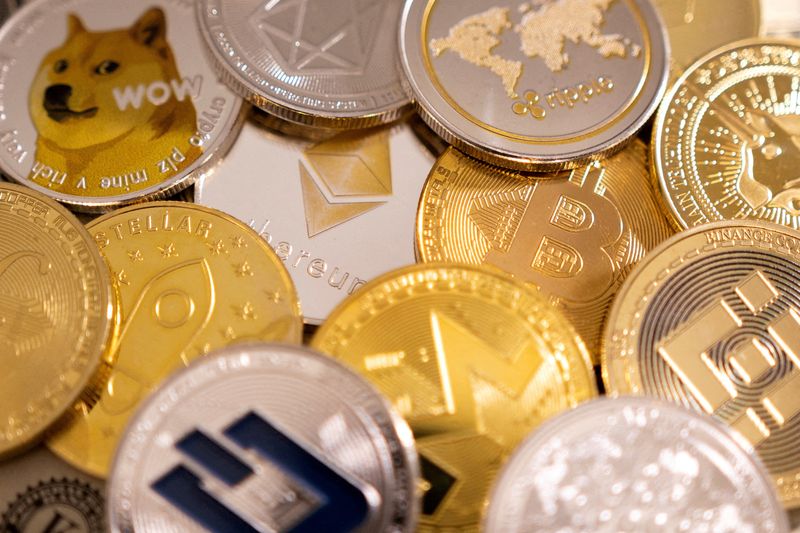
By Stephanie Kelly
NEW YORK (Reuters) - The cryptocurrency industry, a new financial force in the 2024 U.S. election cycle, is surveying candidates for Congress on their views around the digital asset, as the political arm of the movement gains tens of thousands more followers and adds to its war chest.
The survey from the Stand With Crypto Alliance, an advocacy group that aims to organize voters who own crypto and influence public opinion, is a way for a young industry like crypto to engage in political activity in lieu of trade organizations, said Olivia Buckley of OpenSecrets, a research group that tracks money in U.S. politics.
Ultimately candidates who answer the survey in ways the industry deems positive may see support from groups that want to boost crypto-friendly candidates.
Pro-crypto non-profits have been appearing in greater numbers over the past few years, Buckley said.
"Crypto regulation at the federal level remains very much contested and murky, so seeing which candidates can garner support from the industry could be telling as far as what's to come in Congress," she added.
Over a dozen candidates have already filled out the survey, including those from California, Alabama, Texas, Indiana and Maryland, according to Stand With Crypto, though the group declined to provide names.
It plans to push the survey out to candidates of the 468 seats in Congress up for election in November, the group told Reuters.
"It's for crypto advocates and the crypto community to understand where their policymakers, elected officials and candidates in federal races stand on the issue," said Nick Carr, chief strategist for Stand With Crypto.
The survey, seen by Reuters, asks questions such as whether a candidate believes cryptocurrencies like Bitcoin will play a major role in technological innovation, and whether a candidate believes it is important for the U.S. to modernize the regulatory environment for crypto.
It also asks whether a candidate would vote in favor of certain legislation, such as a bill introduced to the House of Representatives last year that would establish a regulatory framework for digital assets.
Stand With Crypto's member count has grown to 370,000 as of Wednesday, up from 315,000 just before March 5's Super Tuesday contests, according to its website. The group was launched in part by Coinbase (NASDAQ:COIN), an online platform for buying and selling crypto.
Pro-crypto candidates are already receiving support from three new super PACs - Fairshake, Defend American Jobs and Protect Progress - that put millions of dollars towards Super Tuesday races.
Collectively, the three super PACs have spent more than $21 million in independent expenditures this election cycle, according to OpenSecrets.
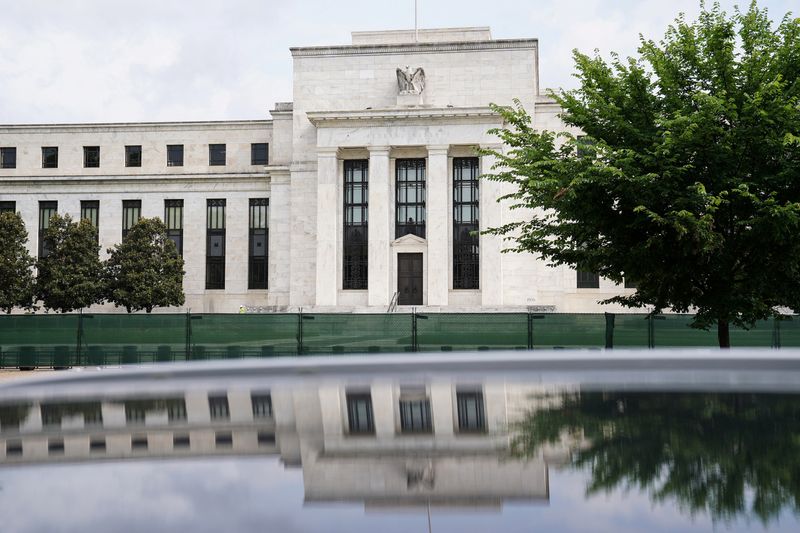
Investing.com -- The Federal Reserve kept rates steady on Wednesday, and maintained forecasts for three rate-cuts this year, pointing to the central bank’s confidence that the recent strength in inflation is unlikely to derail the progress made so far.
The Federal Open Market Committee, the FOMC, kept its benchmark rate in a range of 5.25% to 5.5%.
The decision to keep rates steady for the fifth meeting in a row was widely expected as the Fed chair Jerome Powell previously hinted that March was too soon for the members to have enough confidence from incoming economic data to cut rates.
Fed members continue to see the benchmark rate falling to 4.6% next year, suggesting three rate cuts in 2024, unchanged from the prior projection in December. For 2025 and 2026, however, the Fed sees fewer rate cuts, forecasting rates to fall to 3.9% next year and 3.1% in 2026, up from prior forecasts of 3.6% and 2.9%, respectively.
Following the decision, some on Wall Street continued to call for just two cuts this year.
"Our FOMC view is unchanged on this communication. Our baseline case remains for 50 bps of cuts in 2024 and a further 50 bps in 2025. We expect the first cut in July with risks tilted towards a later start date," David Doyle, head of economics at Macquarie said in a note.
The unchanged decision on the rate path for 2024 comes even as Fed members upgraded their forecasts for inflation and growth this year.
The core personal consumption expenditures price index, the Fed’s preferred measure of inflation, is forecast to be 2.6% in 2024, up from a prior forecast of 2.4%. For 2025 and 2026, inflation is estimated to be 2.2% and 2% unchanged from the prior forecast.
The moderate uptick in the inflation outlook for 2024 suggest that recent upside surprise in inflation data haven't yet shaken the Fed's confidence that a stronger economy and labor market aren't likely to spark another wave of inflation.
Fed members now see the economic growth, or gross domestic product, at 2.1% this year, up from a prior forecast of 1.4%, before slowing to 2% in the 2025 and 2026 from 1.8% and 1.9%, respectively.
The labor market, meanwhile, is expected to remain robust, with the unemployment rate seen at 4% this year, down from a prior projection of 4.1%.
"The downward revision to 2024 unemployment to 4.0% makes it likely the job market will soften more rapidly than officials expect," Citi said in a note.
At the press conference that followed the decision, Federal Reserve Chairman Jerome Powell said the fed act sooner on rate cuts if the labor market unexpectedly weakened.
"If there were significant weakening in the data, particularly in the labour market, that could also be a reason for us to begin the process of reducing rates," Powell said.
The Fed chief also said the balance sheet run-off would likely slow "fairly soon," which markets interpreted as as "dovish," Doyle added.
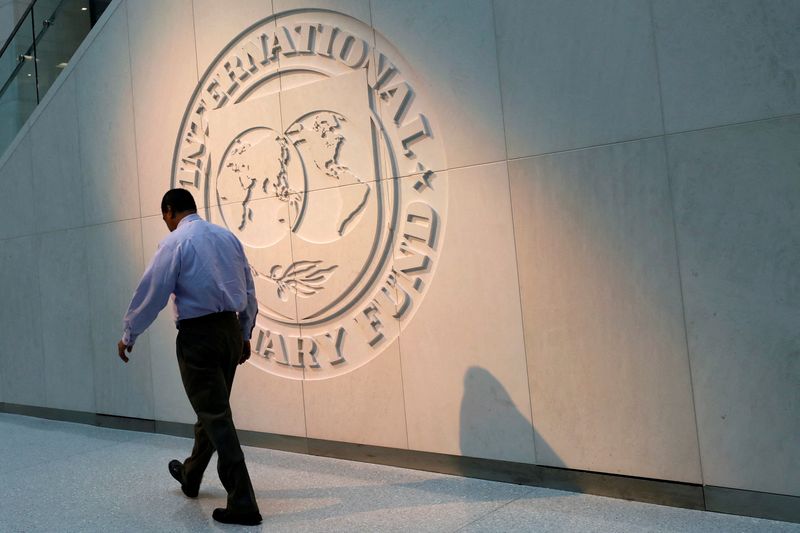
By Ariba Shahid and Asif Shahzad
ISLAMABAD (Reuters) -Pakistan and the International Monetary Fund on Wednesday reached a staff level agreement which, if approved by its board, will disburse $1.1 billion for the debt-ridden South Asian economy, the global lender said.
The funds are the final tranche of a $3 billion last-gasp rescue package Pakistan had secured last summer, which averted a sovereign debt default. Islamabad is also seeking another long-term bailout.
"The IMF team has reached a staff-level agreement with the Pakistani authorities on the second and final review of Pakistan's stabilization program," the IMF said in a statement.
"This agreement is subject to approval by the IMF's Executive Board," it added. The agreement expires on April 11.
The deal comes after the IMF mission held five days of talks with Pakistani officials to review the fiscal consolidation benchmarks set for the loan.
Most Pakistan dollar bonds were trading higher on Wednesday after the deal was announced.
The 2027-maturing bond was up 0.25 cents at 83.957 cents on the dollar while the 2025 bond which was up 0.21 cents at 92.023 cents on the dollar.
Pakistan's Finance Minister Muhammad Aurangzeb had said that Islamabad will seek another long-term bailout. The IMF said Pakistan had expressed interest in a deal, and that it would formulate a medium-term programme if Islamabad applies for one.
The government has not officially stated the size of the additional funding it is seeking through a successor programme, however Bloomberg reported in February that Pakistan planned to seek a new loan of at least $6 billion from the lender.
The debt-ridden economy, which shrank 0.2% last year and is expected to grow around 2% this year, has been under extreme stress with low reserves, a balance of payment crisis, inflation at 23%, policy interest rates at 22% and record depreciation of the local currency.
Ahead of the stand-by arrangement, Pakistan had to meet IMF conditions including revising its budget, and raising interest rates, generating revenues through more taxes and raising the price of electricity and gas, which fuelled inflation.

